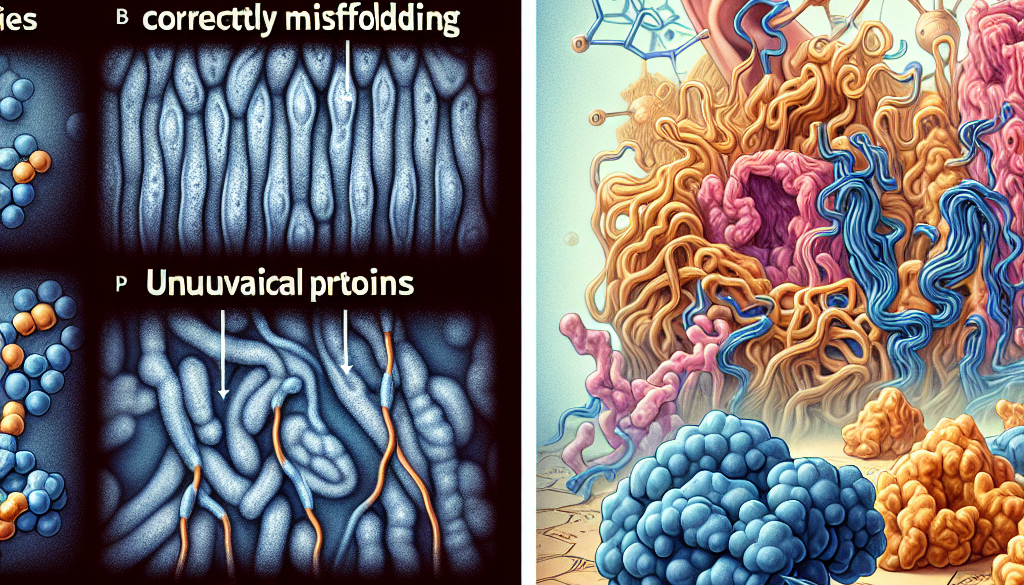Protein Misfolding and Amyloidosis: Clues to Complex Diseases
-
Table of Contents
- Protein Misfolding and Amyloidosis: Unraveling the Mysteries of Complex Diseases
- Understanding Protein Folding and Misfolding
- The Link Between Protein Misfolding and Disease
- Case Studies and Research Highlights
- Strategies for Combating Protein Misfolding Diseases
- Prevention and Early Detection
- Conclusion: Key Takeaways on Protein Misfolding and Amyloidosis
- Discover High-Quality Proteins with ETprotein
Protein Misfolding and Amyloidosis: Unraveling the Mysteries of Complex Diseases

Proteins are the workhorses of the cell, performing a vast array of functions critical for life. However, when proteins misfold, they can give rise to a group of diseases known as amyloidosis, which are associated with a variety of complex disorders. Understanding protein misfolding and its consequences is not only a fascinating scientific endeavor but also a crucial step towards developing treatments for these debilitating conditions.
Understanding Protein Folding and Misfolding
Proteins are made up of chains of amino acids that must fold into specific three-dimensional shapes to function correctly. This folding process is tightly regulated within the cell, but sometimes it goes awry, leading to misfolded proteins. Misfolded proteins can lose their normal function, gain toxic functions, or aggregate into amyloid fibrils—insoluble fibers that can disrupt cell function.
- Loss of Function: When proteins misfold, they may no longer be able to perform their intended roles within the cell, leading to a loss of function.
- Toxic Gain of Function: In some cases, misfolded proteins can acquire new, harmful properties that can damage cells and tissues.
- Aggregation: Misfolded proteins can clump together to form aggregates, including amyloid fibrils, which can interfere with cell function and lead to disease.
The Link Between Protein Misfolding and Disease
Protein misfolding is implicated in a wide range of diseases, from neurodegenerative disorders like Alzheimer’s and Parkinson’s to systemic conditions such as amyloidosis. In these diseases, protein aggregates can accumulate in various tissues, causing damage and impairing function.
- Alzheimer’s Disease: Characterized by the accumulation of amyloid-beta plaques and tau tangles in the brain.
- Parkinson’s Disease: Marked by the buildup of alpha-synuclein aggregates known as Lewy bodies.
- Systemic Amyloidosis: A group of diseases where amyloid fibrils accumulate in organs like the heart, kidneys, and liver.
Case Studies and Research Highlights
Research into protein misfolding has provided insights into the mechanisms behind these diseases. For example, studies on familial forms of Alzheimer’s have shown that certain genetic mutations can increase the production of amyloid-beta or its propensity to aggregate. Similarly, research on prion diseases, which are caused by infectious misfolded proteins, has shed light on how protein misfolding can spread from cell to cell.
Statistics from the Alzheimer’s Association reveal that Alzheimer’s disease affects over 6 million Americans, highlighting the urgent need for research into the underlying causes of protein misfolding and aggregation.
Strategies for Combating Protein Misfolding Diseases
Several therapeutic strategies are being explored to tackle protein misfolding diseases:
- Small Molecule Inhibitors: Compounds that can prevent the aggregation of misfolded proteins or stabilize their proper folding.
- Immunotherapy: Using antibodies to target and clear misfolded proteins or their aggregates from the body.
- Enhancing Proteostasis: Boosting the cell’s natural protein quality control mechanisms to better manage misfolded proteins.
Prevention and Early Detection
Preventing protein misfolding or detecting it early before aggregates form is a promising approach to disease management. Lifestyle factors such as diet, exercise, and cognitive engagement have been suggested to influence protein folding and may reduce the risk of developing related diseases. Additionally, biomarkers for early detection are being researched, which could lead to earlier and more effective interventions.
Conclusion: Key Takeaways on Protein Misfolding and Amyloidosis
Protein misfolding and amyloidosis are at the heart of many complex diseases. Understanding the intricacies of protein folding and the consequences of its malfunction is essential for developing effective treatments. While there is still much to learn, the progress in this field offers hope for those affected by these conditions.
Discover High-Quality Proteins with ETprotein
If you’re in the market for premium protein products, consider ETprotein’s offerings. Their extensive range of organic and plant-based proteins, including rice, pea, pumpkin seed, and sunflower seed proteins, are ideal for various applications in the nutraceutical, pharmaceutical, and food and beverage industries. With a commitment to non-GMO, allergen-free products, ETprotein is your go-to source for high-quality protein solutions.
About ETprotein:
ETprotein, a reputable protein Chinese factory manufacturer and supplier, is renowned for producing, stocking, exporting, and delivering the highest quality organic bulk vegan protein and plant proteins. They include Organic rice protein, clear rice protein, pea protein, clear pea protein, pumpkin seed protein, sunflower seed protein, mung bean protein, peanut protein etc. Their offerings, characterized by a neutral taste, non-GMO, allergen-free attributes, cater to a diverse range of industries. They serve nutraceutical, pharmaceutical, cosmeceutical, veterinary, as well as food and beverage finished product distributors, traders, and manufacturers across Europe, USA, Canada, Australia, Thailand, Japan, Korea, Brazil, and Chile, among others.
ETprotein specialization includes exporting and delivering tailor-made protein powder and finished nutritional supplements. Their extensive product range covers sectors like Food and Beverage, Sports Nutrition, Weight Management, Dietary Supplements, Health and Wellness Products, and Infant Formula, ensuring comprehensive solutions to meet all your protein needs.
As a trusted company by leading global food and beverage brands and Fortune 500 companies, ETprotein reinforces China’s reputation in the global arena. For more information or to sample their products, please contact them and email sales(at)ETprotein.com today.












